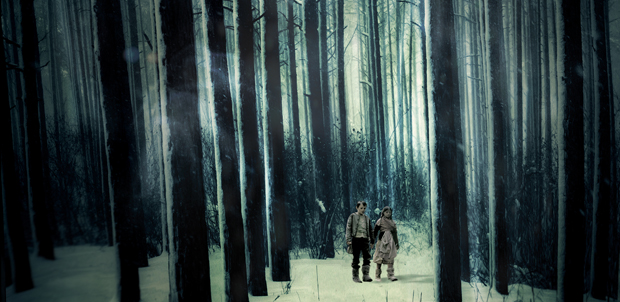Showing @ Festival Theatre, Edinburgh, Tue 14, Thu 16 & Sat 18 Feb
Jacob and Wilhelm Grimm’s scary tale of broken Bavaria, with its parental neglect, disobedient children and cannibalistic confectioners might have been de-clawed a little in Engelbert Humperdinck’s 1893 opera but what it lacks in terror it more than makes up for in charm and musicality.
It’s the charming, magical, playful elements that this production by Scottish Opera concentrates on and director Bill Bankes-Jones and designer Tim Meacock have made the most of a clearly limited budget. The gingerbread house is more of a shed – to create a suitably fairytale environment for the cast to inhabit – and given the reaction of the many small children in attendance it certainly casts its spell.
Musically it’s full of lushly romantic, nineteenth century tunefulness and although Humperdinck’s mentor was Richard Wagner (he assisted him on Parsifal) it’s only in the final scene of Act II that the great composer’s influence is really felt; indeed it’s a scene that seems oddly out of place among the whimsical folk tune influenced score.
Kai Ruutel and Ailish Tynan, both making their Scottish Opera debuts, are suitably unpleasant and brattish as the title characters and although their voices are occasionally swamped by the orchestra, when they’re audible they give fine performances. A face more familiar to Scottish Opera audiences is Leah-Marion Jones as the Witch. In this incarnation the familiar old hag is transformed into a candy-striped confection, saucy and a little coquettish and if it wasn’t for the dietary issues she might even be a fun date.
The outstanding performance however comes from Paul Carey Jones as the father who both in acting and singing terms makes an exuberantly colourful and ebullient pater familias – his bluff, boozy charm shining from the stage. The only negative is Bankes-Jones’ translation from German to English which is variously: banal, silly, impenetrable and anachronistic with far too much slang used which diverts attention from the lyricism of the music. Yet it remains an enjoyable and approachable piece of opera with as much fun on offer as many a panto but with the additional benefit of some euphonic music and attractive performances.
